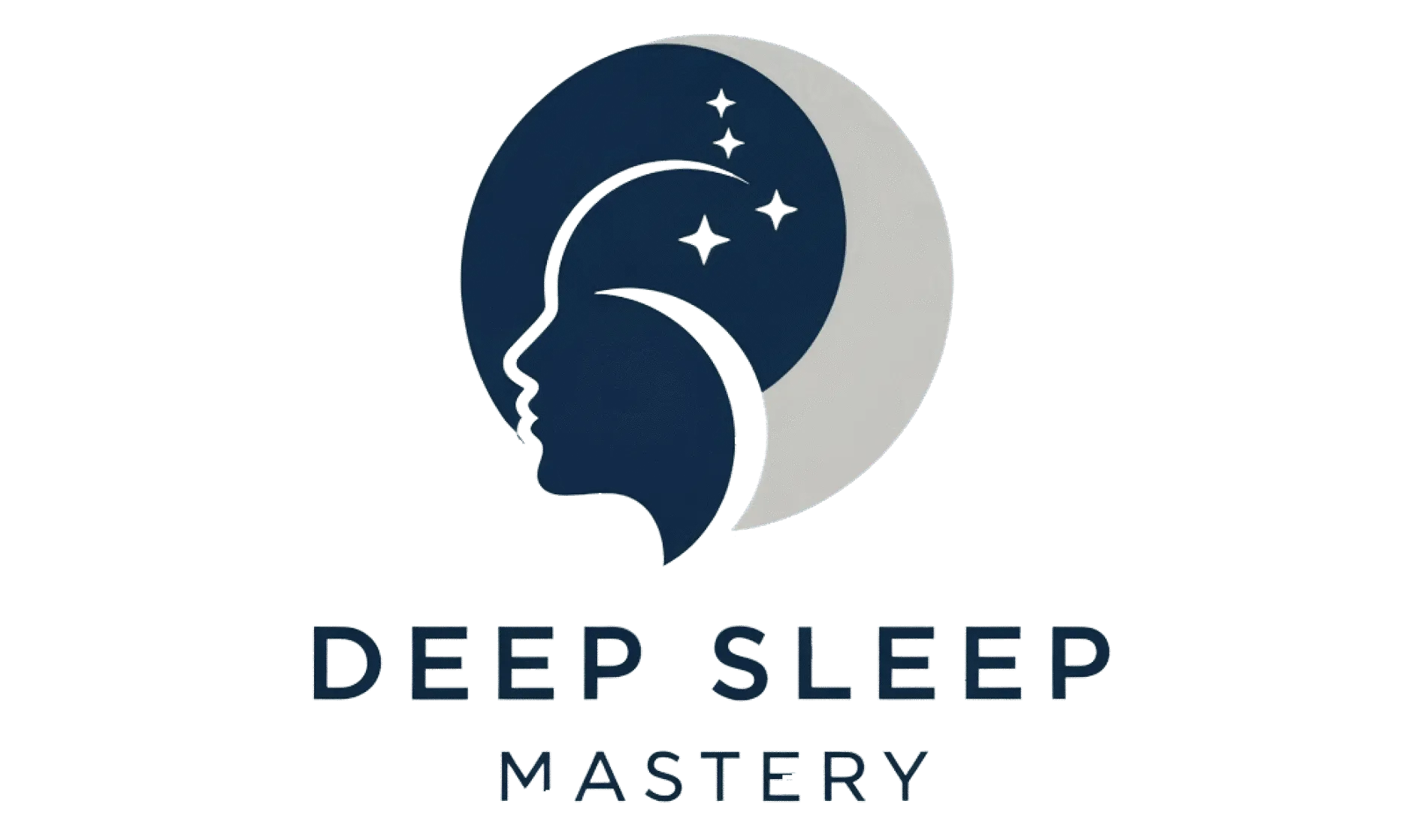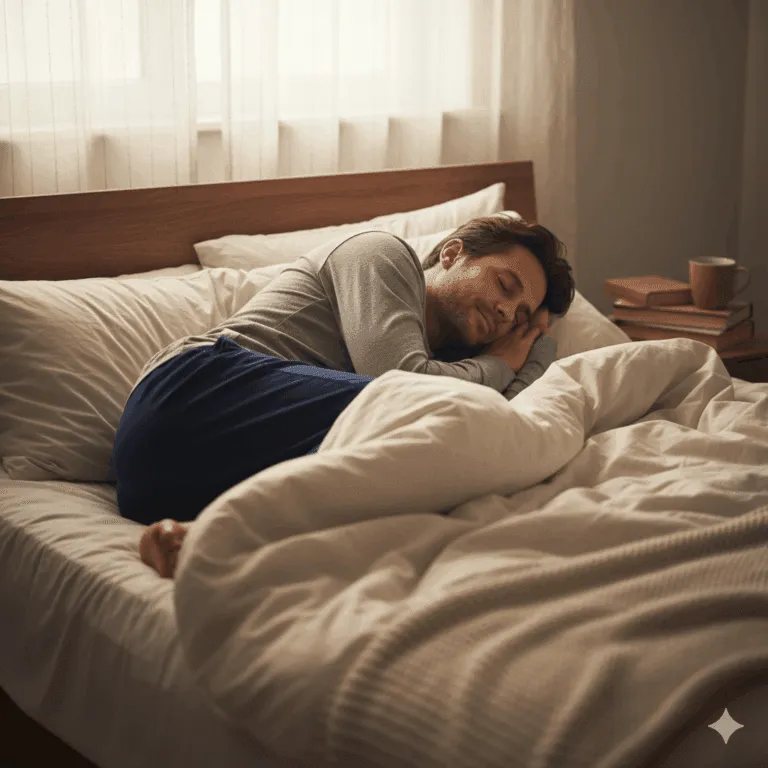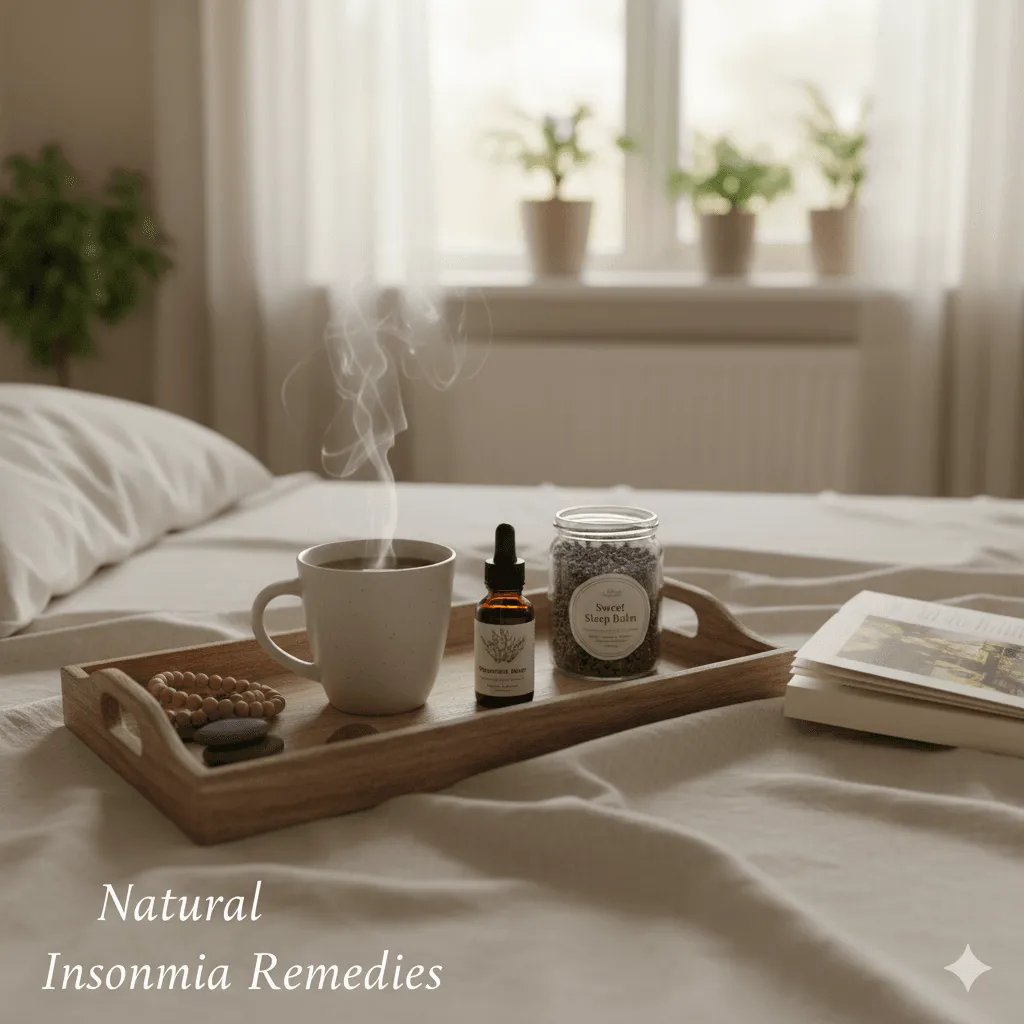
Natural Insomnia Remedies: 12 Science-Backed Ways to Finally Get Better Sleep
Introduction
So here’s a fun fact that’s not fun at all: about 30% of adults deal with insomnia symptoms, and honestly, I was part of that statistic for way too long. I’m talking about those nights where you’re staring at the ceiling at 3 AM, mentally reviewing every awkward conversation you’ve had since middle school. Sound familiar?
Look, I used to think insomnia was just something I had to live with. I’d lie there counting sheep, then counting the hours until my alarm, then calculating exactly how exhausted I’d be the next day. It was exhausting just thinking about being exhausted! But here’s what I’ve learned after years of trial and error (emphasis on the error part): your body actually wants to sleep. We’ve just gotten really good at getting in our own way.
The thing about natural insomnia remedies is they’re not some magic pill situation. I tried those prescription sleep meds once, and sure, I slept—but I also felt like a zombie ate my brain the next morning. Natural approaches take a bit more effort and patience, but they work with your body instead of just knocking you out. And the best part? No weird side effects or morning grogginess that makes you feel like you’re moving through pudding.
In this guide, I’m gonna share everything I’ve discovered that actually works. We’re talking bedroom setups, supplements that don’t mess with your system, breathing tricks that sound ridiculous but genuinely help, and lifestyle tweaks that made me finally understand what “good sleep” actually feels like.
Understanding Why You Can’t Sleep (And Why It Matters)
Okay, so first thing’s first—let’s talk about what insomnia actually is, because not every bad night’s sleep counts. I used to think having trouble sleeping once in a while meant I had chronic insomnia, but turns out there’s a difference.
Occasional sleeplessness is totally normal. Like, you had too much coffee, or you’re stressed about a presentation, or you ate pizza at 10 PM (guilty). That’s just your body responding to stuff. But chronic insomnia? That’s when you can’t sleep at least three nights a week for three months or more. That’s when it becomes a real problem that needs addressing.
And let me tell you, the effects of poor sleep go way beyond just feeling cranky. I remember this period where I was sleeping maybe four or five hours a night for weeks. My memory was shot—I’d forget why I walked into a room, lose my keys constantly, and couldn’t focus on anything for more than five minutes. My immune system basically gave up; I caught every cold that went around. My mood was all over the place too. I’d snap at people for no reason, then feel guilty about it later.
The science backs this up, by the way. Chronic sleep deprivation messes with your hormones, increases inflammation in your body, raises your risk for heart disease and diabetes, and can even contribute to weight gain. Your brain literally cleanses itself during sleep, removing toxins that build up during the day. Skip that process night after night, and things get messy.
Magnesium glycinate was my first discovery, and honestly, it’s still the one I use most consistently. A lot of people are deficient in magnesium without knowing it, and it plays a huge role in sleep quality. It helps relax your muscles and calm your nervous system. I take about 400mg an hour before bed. The glycinate form is important—other types like magnesium oxide can give you digestive issues, which is not what you want when you’re trying to sleep. Within about a week of starting it, I noticed I was falling asleep faster and waking up less during the night.
Here’s what I realized though: understanding the “why” behind your insomnia is actually the first step to fixing it. Once I stopped just accepting sleeplessness as my fate and started paying attention to patterns, things began to shift.
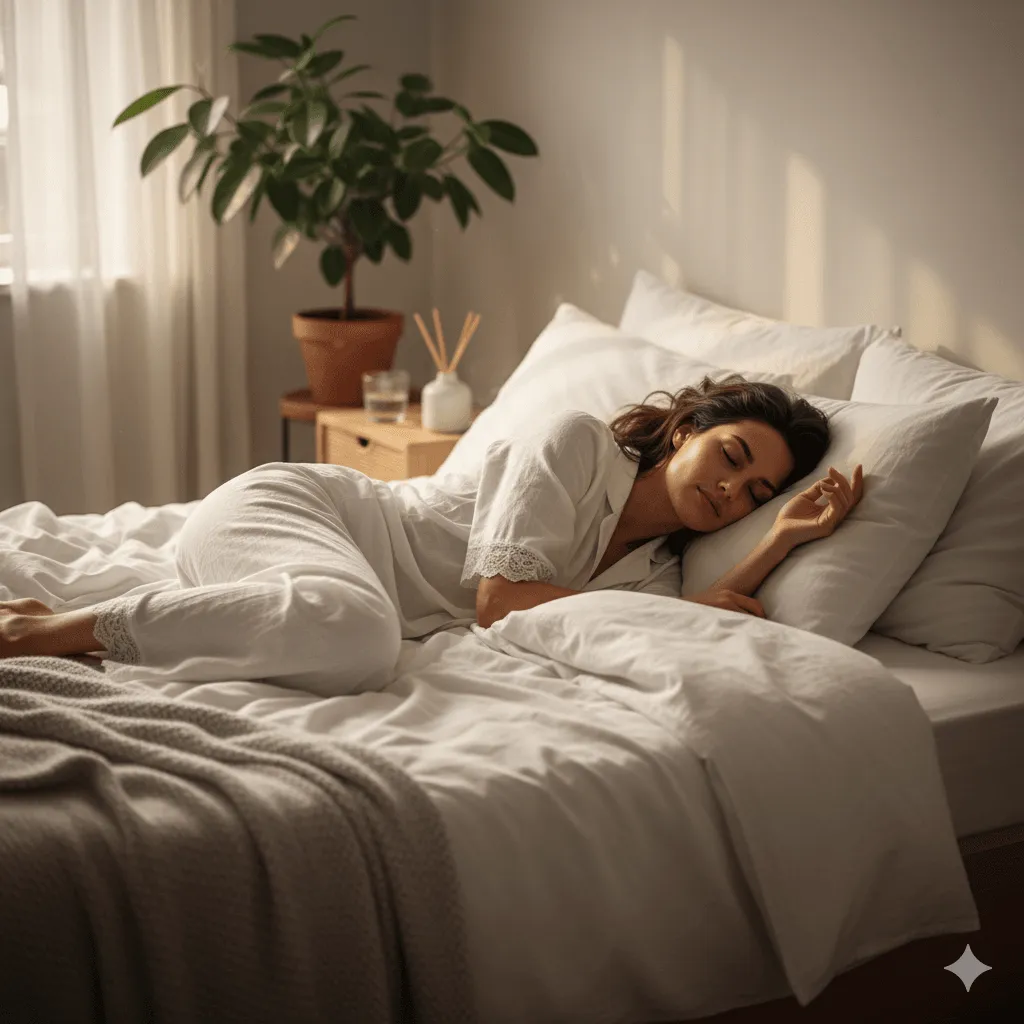
Create a Sleep Sanctuary Your Body Actually Wants
Alright, let’s talk about your bedroom, because chances are it’s working against you. I used to sleep in what was basically a multipurpose room—TV on one wall, desk with my computer on another, clothes piled on a chair, random stuff everywhere. My bedroom was for everything except sleeping. That had to change.
The temperature thing was huge for me. I always thought I just “slept hot,” but it turns out our body temperature naturally drops when we sleep, and if your room’s too warm, it fights that process. The sweet spot is between 65 and 68 degrees Fahrenheit. I know, I know—that sounds freezing. But I got a fan, some breathable sheets, and honestly? Game changer. You can always add blankets if you’re cold, but if you’re too hot, you’re just stuck there sweating and miserable.
Light pollution was another thing I completely underestimated. I had these thin curtains that let in streetlight, car headlights, that neighbor’s porch light that stays on all night. Even tiny amounts of light can suppress melatonin production. I finally invested in blackout curtains, and the difference was immediate. On nights when I travel and don’t have them, I actually notice how much harder it is to stay asleep. Some people use eye masks too, but they bother me—the elastic always gets tangled in my hair.
Then there’s noise. I live in an apartment, and my upstairs neighbors are apparently training for some kind of furniture-moving Olympics. I tried earplugs, but they were uncomfortable and I worried about not hearing my alarm. White noise machines or apps solved this perfectly. I use one that has rain sounds, and it masks those random noises without being annoying. Some people prefer fans or air purifiers for the same effect.
Your mattress and pillow matter more than you think too. I slept on the same cheap mattress for like eight years because I didn’t want to spend the money. Finally replaced it with a medium-firm one that actually supports my back, and wow. I didn’t realize how much tossing and turning I’d been doing trying to get comfortable. Same with pillows—find one that keeps your neck aligned properly. I’m a side sleeper, so I needed something thicker to fill that gap between my head and the mattress.
One last thing: make your bedroom boring. I removed the TV, moved my desk to another room, and basically turned my bedroom into a place that’s only for sleep (and, you know, other bedroom activities). No work, no eating, no binge-watching shows. Your brain needs to associate that room with sleep, not with all the stimulating stuff that keeps you wired.
The Sleep Hygiene Routine That Changed Everything
Sleep hygiene sounds like something a doctor made up to make you feel bad about your choices, but it’s actually just a fancy way of saying “habits that help you sleep.” And let me tell you, establishing a consistent routine was probably the single most effective thing I did for my insomnia.
The foundation is going to bed and waking up at the same time every day. Yes, even on weekends. I hated hearing this advice because weekends were my time to “catch up” on sleep. But guess what? Sleep debt doesn’t work like that. Sleeping until noon on Saturday just messes up your circadian rhythm, making Sunday night insomnia almost guaranteed. When I finally committed to the same schedule seven days a week, my body started naturally getting tired at bedtime. It took about two weeks, but then it clicked.
I also started using what’s called the 10-3-2-1-0 rule, which sounds complicated but is actually pretty simple. No caffeine 10 hours before bed. No food or alcohol 3 hours before bed. No work 2 hours before bed. No screens 1 hour before bed. And when your alarm goes off, zero snoozing. This framework gave me clear boundaries instead of just vaguely trying to “wind down.”
Creating a pre-bed ritual signals your brain that sleep is coming. Mine looks like this: around 9 PM, I dim the lights throughout my apartment. I make some chamomile tea (more on that later), do my skincare routine, maybe read for 20 minutes. Nothing exciting, nothing stimulating. Just calm, boring activities. At first, I felt silly being so ritualistic about it, but it works. My body now knows that when I start this sequence, sleep is coming.
What you avoid before bed matters just as much. Hot showers feel great, but they raise your body temperature when you actually need it to drop for sleep. I switched to taking them earlier in the evening or doing lukewarm showers before bed. Exercise is another timing thing—it energizes you, so doing it too close to bedtime is counterproductive. And I already mentioned screens, but seriously, put the phone down. I know it’s hard (believe me, I know), but the blue light and mental stimulation will sabotage your sleep every time.
The consistency piece cannot be overstated. Your body craves routine, and your circadian rhythm runs on it. Even when I didn’t feel tired at bedtime initially, I’d still go through the motions. Eventually, my body adapted.
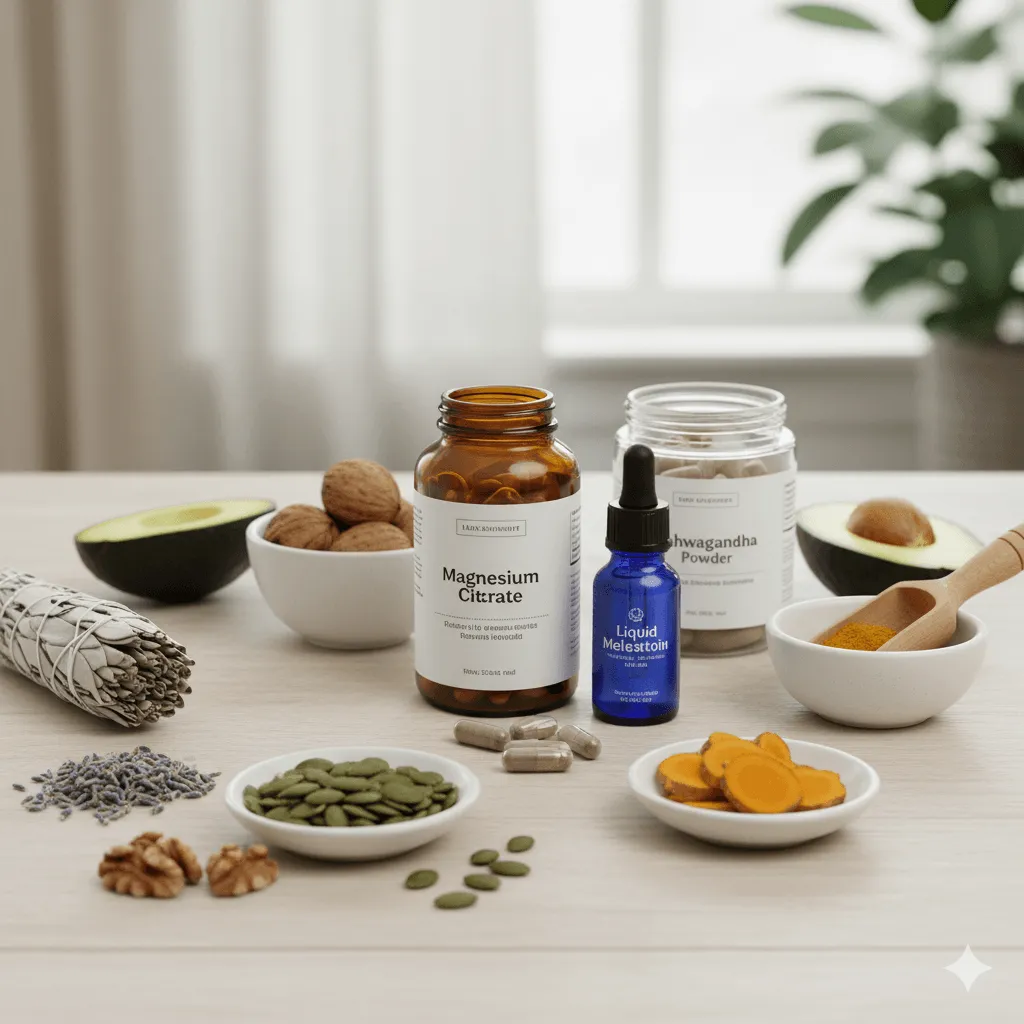
Natural Supplements That Actually Help You Sleep
Let me start by saying I’m not a doctor, and you should definitely talk to one before starting any supplements, especially if you’re on other medications. That said, certain natural supplements made a real difference for me when nothing else was working.
Magnesium glycinate was my first discovery, and honestly, it’s still the one I use most consistently. A lot of people are deficient in magnesium without knowing it, and it plays a huge role in sleep quality. It helps relax your muscles and calm your nervous system. I take about 400mg an hour before bed. The glycinate form is important—other types like magnesium oxide can give you digestive issues, which is not what you want when you’re trying to sleep. Within about a week of starting it, I noticed I was falling asleep faster and waking up less during the night.
Melatonin is probably what most people think of first, but I had to learn how to use it properly because I made every mistake possible at first. I started with those 10mg gummies from the drugstore, took one right before bed, and woke up feeling absolutely terrible. Turns out, less is more with melatonin. Most people only need 0.5 to 3mg, and you should take it about 2 hours before bedtime, not right when you’re getting into bed. It’s not a sedative—it just signals to your body that it’s time to start the sleep process. These days I use 1mg about two hours before bed, and it works way better.
L-theanine is an amino acid from tea that promotes relaxation without making you drowsy during the day. I take it in supplement form at night (around 200mg), and it helps quiet that mental chatter. You know that feeling where your brain is just spinning through tomorrow’s to-do list or replaying conversations? L-theanine takes the edge off that without making you feel sedated.
Valerian root and passionflower are herbs I use occasionally, but not every night. They’re a bit stronger, and valerian root in particular can smell pretty funky. But on nights when I’m really struggling, they help. They work kind of like a mild sedative, promoting relaxation and drowsiness. Some people build tolerance to them though, so I cycle them—use them for a few days, then take a break.
One thing I learned the hard way: don’t take everything at once, especially when you’re just starting. Introduce one supplement at a time so you can see how your body responds. And quality matters—I wasted money on cheap supplements that probably had half the actual ingredients they claimed. Brands that do third-party testing are worth the extra cost.
Herbal Teas and Bedtime Beverages for Better Rest
There’s something about a warm drink before bed that just feels right, you know? But beyond the comfort factor, certain teas and beverages actually have compounds that promote sleep. This became my favorite bedtime ritual because it’s enjoyable and functional.
Chamomile tea is the classic for a reason. It contains apigenin, an antioxidant that binds to certain receptors in your brain that promote sleepiness and reduce anxiety. I drink a cup about 30-45 minutes before bed. The first few times, I didn’t notice much, but after drinking it consistently for a week or two, I realized I was falling asleep more easily. Plus, the ritual of making tea and sitting quietly while drinking it became its own form of meditation.
Lavender tea is another good one, especially if anxiety is keeping you awake. Lavender has been shown to reduce anxiety and promote calmness. Fair warning though: the taste is pretty floral. Some people love it, others find it too perfume-y. I usually mix it with chamomile to balance the flavor.
Here’s something I discovered by accident: tart cherry juice. I was reading about natural sources of melatonin and learned that tart cherries (Montmorency cherries specifically) are one of the few food sources that contain actual melatonin. I started drinking about 4 ounces in the evening—not right before bed because it’s acidic and I didn’t want heartburn—and my sleep quality improved. It’s a bit tangy, so I dilute it with water, but it’s totally drinkable.
Golden milk, or turmeric latte, became my go-to when I wanted something more substantial. It’s warm milk (I use oat milk) with turmeric, ginger, cinnamon, and a little honey. Turmeric has anti-inflammatory properties, and the warm milk contains tryptophan, which converts to serotonin and then melatonin. It’s like a cozy hug in a mug. Just make sure you don’t use too much turmeric or ginger because they can be stimulating in large amounts.
Now, what to avoid: anything with caffeine, obviously. But also alcohol, which a lot of people think helps them sleep. Sure, you might fall asleep faster, but alcohol disrupts your REM sleep and causes you to wake up more during the night. I used to have a glass of wine to “relax” before bed, and I’d always wake up around 3 AM unable to get back to sleep. Once I cut it out, my sleep became way more consolidated.
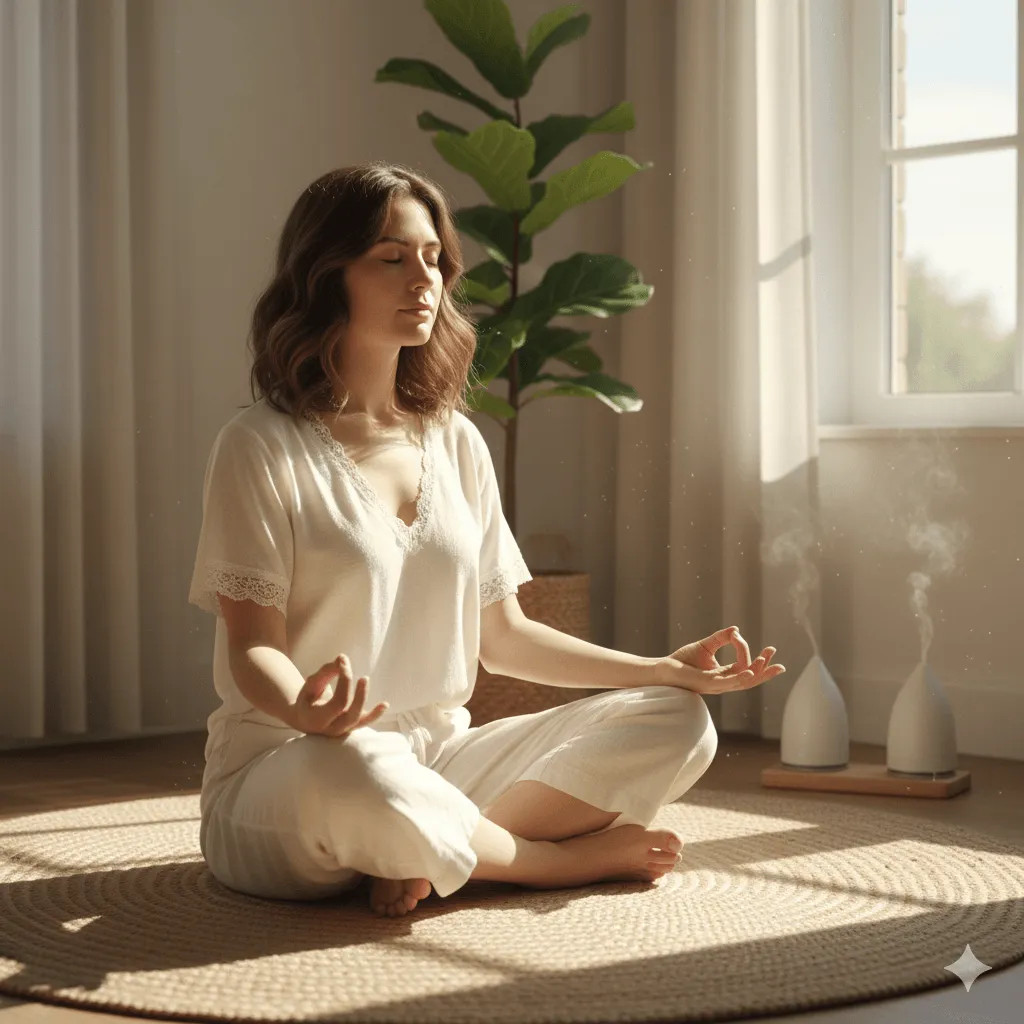
Breathing Techniques and Meditation for Racing Minds
Okay, this is where we get a little woo-woo, but stay with me because these techniques actually work. When your mind is racing at bedtime, you need tools to bring your focus back to your body and activate your parasympathetic nervous system—the “rest and digest” mode.
The 4-7-8 breathing method changed the game for me. It’s super simple: breathe in through your nose for 4 counts, hold for 7 counts, exhale through your mouth for 8 counts. The longer exhale is key because it activates the vagus nerve and tells your body it’s safe to relax. I usually do four rounds of this, and by the end, I feel noticeably calmer. Sometimes I fall asleep during it. The first time I tried it, I felt kind of silly and didn’t think it was doing anything, but then I realized I’d been lying there for only 10 minutes instead of my usual hour of tossing and turning.
Body scan meditation is another tool that helps when you’re physically tense. You start at your toes and mentally scan up through your entire body, noticing any tension and consciously relaxing each part. It serves two purposes: it gives your racing mind something specific to focus on, and it releases physical tension you might not even realize you’re holding. I clench my jaw constantly without noticing, and body scans help me catch it and release it.
Progressive muscle relaxation is similar but more active. You tense each muscle group for 5 seconds, then release. Start with your toes—squeeze them tight, then let go. Move up to your calves, thighs, glutes, stomach, chest, arms, hands, shoulders, neck, and face. It sounds like it would be energizing, but the release after the tension actually promotes relaxation. Plus, it’s something to do when you’re just lying there feeling frustrated.
I also use guided sleep meditation apps. Insight Timer and Calm have free options, and they’re great for nights when I can’t focus enough to do techniques on my own. There’s something about a soothing voice guiding you that just makes it easier. Some of them incorporate storytelling—boring stories designed to make you drift off. It feels like someone reading you a bedtime story, which is oddly comforting even as an adult.
The trick with all these techniques is not to pressure yourself. If your mind wanders, that’s fine—just gently bring it back. I used to get frustrated when meditation “wasn’t working,” which of course made it work even less. Once I accepted that mind-wandering is part of the process, the techniques became much more effective.
Exercise Timing and Movement for Better Sleep
Exercise was tricky for me to figure out because everyone gives different advice. Some say morning workouts are best, others swear by afternoon exercise. What I learned is that movement helps sleep, but timing matters a lot.
Morning or early afternoon exercise is generally best for sleep. It raises your core body temperature and gets your adrenaline going, which is great for being alert during the day but terrible for sleep if it happens too close to bedtime. I started doing my workouts around 10 AM or noon, and it made a difference. The burst of energy carried me through the day, and by evening I felt naturally tired rather than wired.
That said, gentle movement in the evening can actually help. I do light yoga about an hour or two before bed—nothing intense, just stretches and poses that promote relaxation. Child’s pose, legs up the wall, seated forward fold, reclined butterfly. These poses activate the parasympathetic nervous system and release tension. Sometimes I fall asleep doing legs up the wall, which is probably not great for my back, but it shows how relaxing it is.
Morning sunlight exposure is technically movement-adjacent, but it’s huge for regulating your circadian rhythm. Getting outside within an hour of waking up signals to your brain that it’s daytime, which helps it produce melatonin at the right time later. I take a 15-minute walk in the morning, and even on cloudy days, the outdoor light is brighter than indoor lighting. On days when I skip this, I notice my sleep timing gets wonky.
The exercise I avoid before bed: high-intensity stuff like running, HIIT workouts, or heavy weightlifting. I learned this the hard way after doing an evening spin class once. I came home buzzing with endorphins and energy, and even though I was physically exhausted, my brain was wide awake. I didn’t fall asleep until well past midnight.
Consistency with movement matters too. On weeks when I’m sedentary, my sleep quality tanks. My body has energy to burn, and if I don’t use it during the day, it keeps me up at night. Even just walking makes a difference—doesn’t have to be formal exercise.
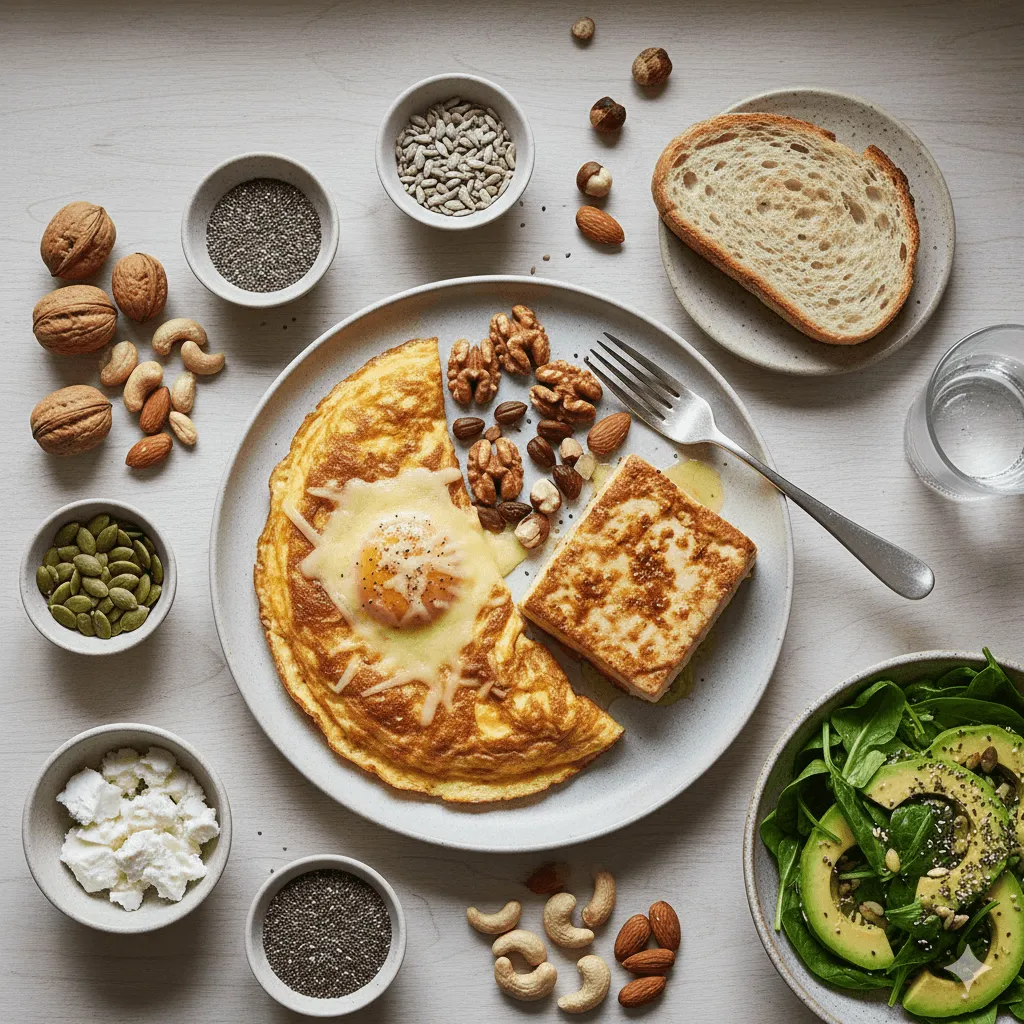
Foods That Help (and Hurt) Your Sleep Quality
I never paid much attention to the connection between food and sleep until I started keeping a sleep diary. Turns out, what you eat—and when you eat it—can absolutely make or break your sleep.
Foods rich in tryptophan became my friends. Turkey is the famous one, but I don’t eat a turkey dinner every night. Instead, I focus on things like eggs, cheese, nuts, seeds, and tofu. Tryptophan is a precursor to serotonin and melatonin, so getting enough of it supports your body’s natural sleep-wake cycle. I’ll have a small handful of almonds or walnuts in the evening if I’m a bit hungry.
Complex carbohydrates help too, and here’s why: they increase the availability of tryptophan in your brain. So pairing a protein source with complex carbs is actually a smart move. I’ll have whole grain toast with almond butter or oatmeal with banana a few hours before bed. The key is timing—not right before bed, because then you’re dealing with digestion, but a few hours before so your body has time to process it.
What I had to cut out or limit was more eye-opening. Caffeine was the obvious one—I used to have coffee until 4 or 5 PM and couldn’t figure out why I couldn’t sleep. Caffeine has a half-life of about 5-6 hours, which means half of it is still in your system that long after you drink it. Now I cut myself off at noon, and even decaf only in the morning because it still has some caffeine.
Alcohol was harder to accept because I genuinely enjoyed a glass of wine with dinner. But alcohol fragments your sleep, reduces REM sleep, and makes you wake up more often. On nights when I do drink, I make sure it’s at least 3-4 hours before bed and I have plenty of water. The sleep quality difference is noticeable.
Heavy meals before bed are a disaster for me. The digestion process can keep you awake or cause reflux if you lie down too soon. I try to finish dinner at least 3 hours before bed. If I’m hungry later, I stick to a light snack—nothing greasy, nothing spicy, nothing that’s going to sit in my stomach like a rock.
Sugar and refined carbs before bed spike your blood sugar, then it crashes, and guess what? You wake up at 3 AM feeling anxious and alert. I learned this after eating ice cream before bed a few too many times. Now I save dessert for earlier in the evening.
Technology Habits Sabotaging Your Sleep
Let’s be real: technology is probably your biggest sleep saboteur, and it’s the hardest one to fix because we’re all basically addicted to our devices. But understanding how it affects sleep helped me finally make changes.
Blue light is the big villain here. Your phone, tablet, computer, and TV all emit blue light, which suppresses melatonin production. Your brain sees that light and thinks “hey, it’s daytime!” even when it’s 11 PM. I used to scroll through social media in bed, and it would be an hour before I could fall asleep. Once I stopped bringing my phone to bed, the difference was dramatic.
My solution was to set a “device curfew” one hour before bed. All screens go off, phone gets plugged in across the room (not on my nightstand), and I do other activities. The first week was awful—I felt anxious and bored and kept reaching for my phone by habit. But after pushing through, I don’t even miss it. I read instead, or do my skincare routine slowly, or just lie there thinking.
Blue light blocking glasses are an option if you absolutely have to use screens in the evening. I use them when I’m traveling or have to work late. They’re not as good as just avoiding screens, but they help. There are also apps and settings that reduce blue light on your devices—Night Shift on iPhone, for example. I have mine set to kick in at sunset.
The content you consume matters too, not just the light. Watching intense shows, reading work emails, or scrolling through news before bed stimulates your brain. I made the mistake of watching a thriller series right before bed once, and surprise, I had nightmares and woke up repeatedly. Now I’m boring on purpose—nature documentaries, calm podcasts, nothing that’s going to get my heart racing or mind spinning.
Notifications are another problem. Every buzz and ping pulls you out of sleep or prevents you from falling asleep. I put my phone on Do Not Disturb mode every night, and I don’t use it as my alarm anymore (bought a cheap alarm clock instead). The peace of mind knowing I won’t be woken up by random notifications is worth it.
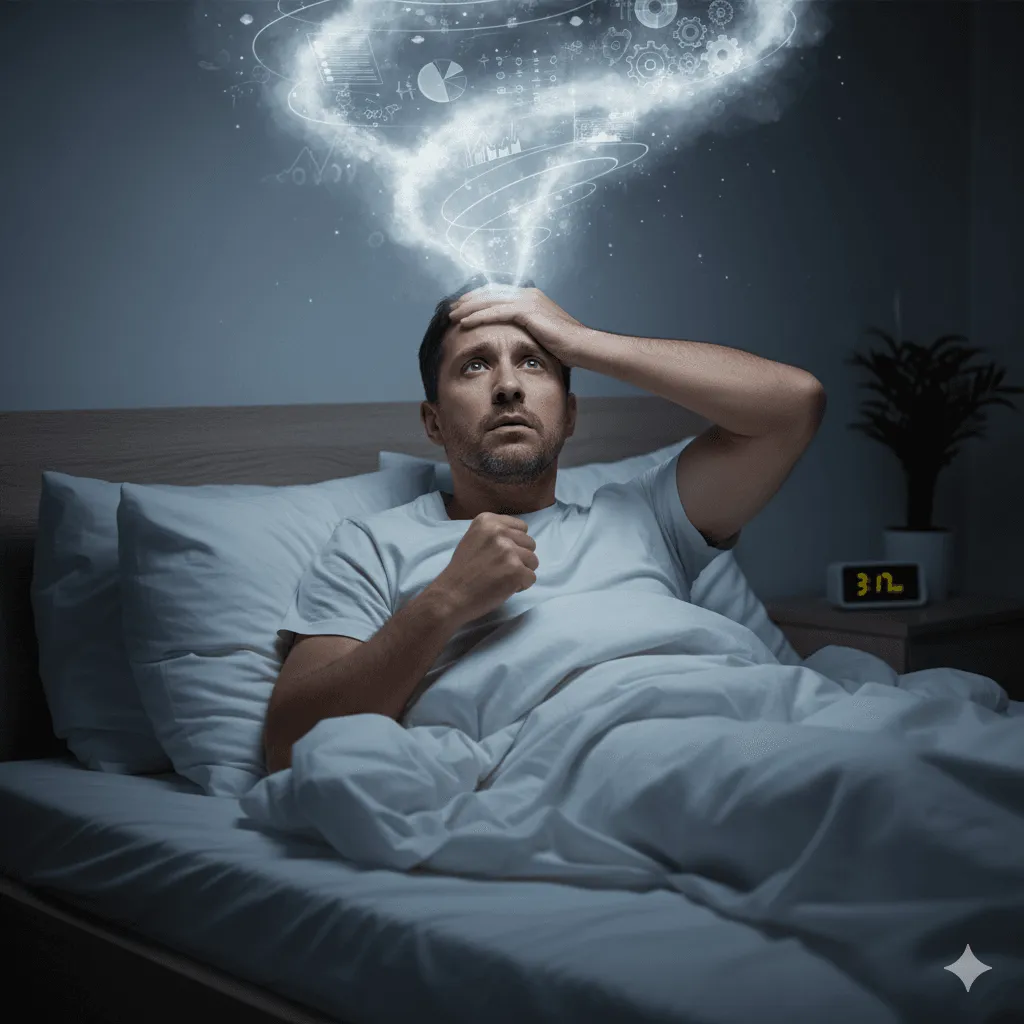
Cognitive Techniques When Your Mind Won’t Shut Off
This is where I spent most of my time struggling, because my particular brand of insomnia was 90% mental. My body was tired, but my brain was like “hey, let’s review every embarrassing thing you’ve ever done and plan the next five years!”
The worry journal was a game changer. I keep a notebook by my bed, and if I can’t sleep because I’m worried about something, I write it down. Tasks I need to do, problems I need to solve, random concerns—I dump them all on paper. Something about externalizing those thoughts makes my brain relax its grip on them. It’s like saying “okay, I’ve recorded this, we can deal with it tomorrow.”
Cognitive shuffling is weird but effective. You think of a random, emotionally neutral word—like “table”—and then for each letter, you think of as many words as you can that start with that letter. T: tomato, tiger, tennis, Tuesday. A: apple, anchor, April, afternoon. It gives your brain something boring to do, and because the words are random and unconnected, it prevents anxious narrative thinking. I usually fall asleep before finishing the word.
The counting backwards technique is similar—pick a number like 1000 and count backwards by sevens. 1000, 993, 986, 979… It’s just complicated enough to occupy your brain but boring enough that you’ll drift off. I rarely make it below 800.
Here’s a rule that seems counterintuitive but helped me: if you’ve been in bed for 20 minutes and can’t sleep, get up. Lying there getting frustrated and stressed just teaches your brain that bed is a place for being awake and anxious. Get up, go to another room, do something calming (I read by a dim light), and only go back when you feel sleepy. This is called stimulus control, and it reinforces the bed-sleep connection.
I also had to let go of the “trying” to sleep. The more you try to force sleep, the more elusive it becomes. Instead, I tell myself I’m just going to rest. Take the pressure off. Sometimes I’ll play a little mental game where I imagine I’m somewhere peaceful—a cabin in the woods, a beach at sunset—and I’ll focus on sensory details. What does it smell like? What sounds do I hear? This kind of guided visualization occupies my mind in a non-anxious way.
Essential Oils and Aromatherapy for Sleep
I was skeptical about essential oils because they seemed trendy and overpriced, but aromatherapy for sleep is actually backed by research. Certain scents can promote relaxation and improve sleep quality.
Lavender is the most studied and most effective. Multiple studies show that lavender scent can increase deep sleep and help people feel more refreshed in the morning. I use a diffuser with lavender essential oil in my bedroom—about 4-5 drops in water, turned on 30 minutes before bed. The scent isn’t overpowering; it’s just gently present. I also have a lavender pillow spray that I use occasionally.
Cedarwood and bergamot are other good options. Cedarwood has this warm, woodsy scent that’s grounding and calming. Bergamot is citrusy but actually has relaxing properties (even though most citrus scents are energizing). I sometimes mix these with lavender for variety.
Safety matters with essential oils, though. Never apply them directly to your skin without diluting them in a carrier oil—they’re super concentrated and can irritate or burn. And if you have pets, especially cats, be careful because some essential oils are toxic to them. I had to look this up when I got a cat, and I make sure my diffuser is in a room he doesn’t sleep in.
Creating a scent routine helped reinforce my sleep cues. My brain now associates lavender with bedtime, so when I smell it, I automatically start feeling sleepy. It’s Pavlovian, but it works. On nights when I travel and don’t have my oils, I actually miss that scent cue.
One warning: don’t expect essential oils to be a magic solution on their own. They’re part of a bigger sleep hygiene picture. They work best when combined with other techniques—the bedroom environment, the routine, the supplements, all of it together.
When to Seek Professional Help for Insomnia
Look, I tried to solve my insomnia on my own for way too long, and in retrospect, I should’ve talked to a doctor sooner. There are times when natural remedies aren’t enough, and that’s okay.
If you’ve been dealing with insomnia for more than three months despite trying these techniques, it’s time to see a healthcare provider. Chronic insomnia can be a symptom of underlying health issues like sleep apnea, thyroid problems
